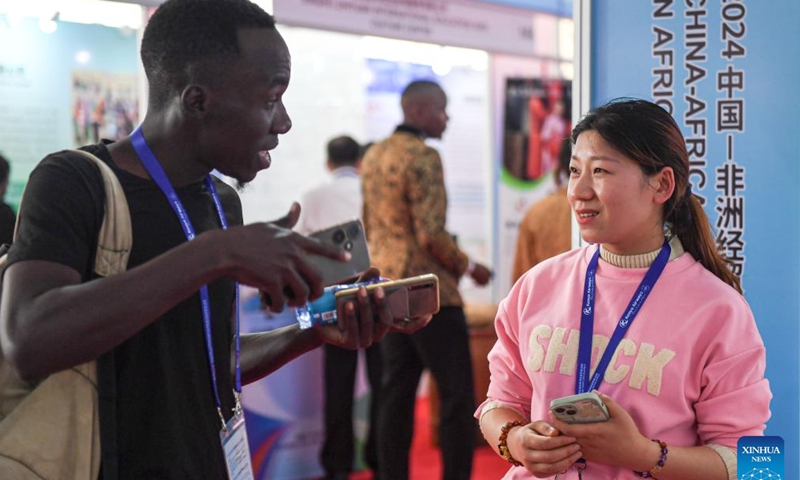
An exhibitor (R) briefs products to a visitor during the China-Africa Economic and Trade Expo (CAETE) in Africa (Kenya) 2024 in Nairobi, Kenya, May 9, 2024.
Cooperation between China and Africa will continue to expand under a series of initiatives, including the Belt and Road Initiative (BRI), despite certain external forces' attempt to undermine China-Africa ties, several ambassadors of African countries to China said in a recent interview with the Global Times.
At the Africa Day Gala Night held by China's Foreign Ministry and the African diplomatic corps on Saturday, the African envoys rejected accusations such as the "debt trap" manufactured by Western officials and media outlets to smear China-Africa cooperation, dismissing such claims as just noise.
"Strengthening solidarity and cooperation with Africa is China's unwavering strategic choice. Despite changing international dynamics, China and Africa have always supported each other, maintaining a robust traditional friendship," Vice Foreign Minister Chen Xiaodong stated at the event.
In recent years, China-African trade has flourished, with the BRI yielding significant results. This year marks a significant year for China-Africa relations, with a new session of the Forum on China-Africa Cooperation (FOCAC) to be held.
China aims to use the FOCAC as an opportunity to deepen cooperation under the BRI and the three major global initiatives, fostering a higher-level China-Africa community with a shared future, according to Chen.
In interviews with the Global Times, several ambassadors expressed their optimism about deeper China-Africa cooperation and downplayed US and Western narratives critical of China's role in Africa.
Ambassador Rahamtalla Mohamed Osman, the African Union's Permanent Representative to China, praised the FOCAC as a unique platform that allows African countries and China to discuss their mutual needs and achievements every three years. "FOCAC provides an opportunity for frank discussions about what Africa needs from China and vice versa," he said.
"Since 2000, trade between China and Africa has grown from $10 billion to over $282 billion, which is quite remarkable, and it can be more," Ibrahima Sory Sylla, Senegalese Ambassador to China, told the Global Times at the event.
"At the upcoming FOCAC, we hope to explore promising areas of cooperation… With over 400 million young people in Africa aged 24 to 35, we hope to provide them with opportunities for training in China in specialized fields such as food processing, agriculture, medicine and industrialization."
"Indeed, our collaboration under the BRI continues, but it is now expanding toward electric motor vehicles. We aim to green our manufacturing processes and are collaborating with China on clean energy storage, as China has advanced technology in this area," Ambassador of Kenya to China Willy Bett told the Global Times on Saturday.
When it comes to some speculation from the Western media about so-called debt traps and overcapacity issues, the ambassador gave his view. "Every country, every manufacturer is free to produce what is required in the world. When we talk about overcapacity, nobody produces what is not consumed."
"If China is producing what the world requires, what's the problem with that?" Bett asked.
"I don't agree with the voice that China is employing a debt trap in terms of providing infrastructure development to Africa because it is not China that is imposing, it is Africa that is applying," he added.
Ambassador of Somalia to China Awale Ali Kullane also expressed a view about the ties between the two countries. "Somalia has the longest coast in Africa, so we are working with China on improving our fishery products. China is one of the largest buyers of Somalia's tuna and so on."
"We have greater potential for cooperation under the Belt and Road Initiative, as well as the Global Development Initiative, the Global Security Initiative and the Global Civilization Initiative. All these things are intertwined, but they also provide greater opportunity and bridge-building from both sides."
"Somalia and China worked together very well in the past, and we hope to work together much stronger in the future," said Kullane.
"Other perspectives, we just leave it to those who made it. In Somalia's view, the BRI is an opportunity and China's engagement is a healthy one. And we don't only join it just so that we can, because it's there, we think it's the best way the globe can work together," Kullane told the Global Times.




